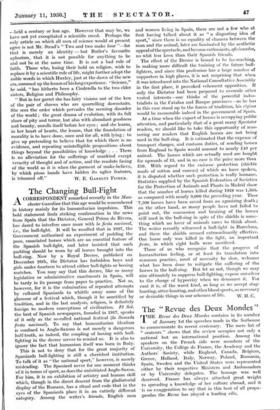The Changing Bull-Fight
ACORRESPONDENT remarked recently in the Man- chester Guardian that this age would be remembered in history mainly for its' humanitarian impulsion. This bold statement finds striking confirmation in the news from Spain that the Dictator, General Primo de Rivera, has dared to interfere once more with la fiesta nacional, i.e., the bull-fight. It will be recalled that in 1927, the • Government authorized an experiment of padding the poor, emaciated horses which are an essential feature of the Spanish bull-fight, and later insisted that such padding should be worn by all horses brought into the bull-ring. Now by a Royal Decree, published on December 26th, the Dictator has forbidden boys and girls under fourteen to attend either bull-fights or boxing matches. You may say that this decree, like so many legislative or administrative enactments in Spain, will be tardy in its passage from paper to practice. Not so, however, for it is the culmination of repeated attempts by cultured Spaniards to whittle away some of the glamour of a festival which, though it be sanctified by tradition, and in the last analysis, religion, is definitely foreign to 'modern conceptions of civilization. El Sol, the best of Spanish newspapers, founded in 1917, speaks of it only as the so-called national festival (la llama& fiesta nacional). To say that humanitarian idealism is confined to Anglo-Saxons is not merely a dangerous half-truth, as indeed, the coupling of boxing with bull- fighting in the decree serves to remind us. It is also to ignore the fact that humanism itself was born in Italy. This is not to deny that for the great majority of Spaniards bull-fighting is still a cherished institution. To talk of it as " the national sport," however, is merely 'misleading. The Spaniard never for one moment thinks of it in terms of sport, as does the uninitiated Anglo-Saxon. i For him, it is an exhibition of artistry and human skill *hick, though in the direct descent from the gladiatorial display of the Romans, has a ritual and code that in 'the eyes of the Spaniards place it in an entirely different 'category. Among the writer's friends, English men and women living in Spain, there are not a few who at first having talked about it as " a disgusting idea of sport," since there is no equality of chances between the man and the animal, later are fascinated by the aesthetic appeal of the spectacle, and become enthusiasts, aficionados, no whit less keen than their Spanish friends.
The effect of the Decree is bound to be far-reaching, in making more difficult the training of the future bull- fighters, and since this profession has a large number of supporters in high places, it is not surprising that when it was introduced into the National Consultative Assembly in the first place, it provoked vehement opposition. If only the Dictator had been prepared to overrule other vested interests—one thinks of the powerful indus- trialists in the Catalan and Basque provinces—as he has in this case stood up to the forces of tradition, his riginte would be memorable indeed in the government of Spain.
At a time when the export of horses is occupying public attention, and particularly that of a great many Spectator readers, we should like to take this opportunity of reas- suring our readers that English horses are not being used in the bull-ring. It is estimated that the expense of transport charges, and customs duties, of sending horses from England to Spain would amount to nearly £40 per animal. The horses which are actually used are bought for upwards of £3, and in no case is the price more than £10. With. regard to the cuirasse protection (shields made of cotton and canvas) of which we have spoken, it is disputed whether such protection is really humane. Statistics supplied by the Spanish Federation of Societies for the Protection of Animals and Plants in Madrid show that the number of horses killed during 1928 was 1,500, as compared with nearly 9,000 the preceding year. Thus "7,500 horses have been saved from an agonizing death ; on the other 'hand, as many people have not failed to point out, the concussion and bruising of the horses still'nsed in the bull-ring in spite of the shields is some- thing which no lover .of animals cares to think about. The writer recently witnessed a bull-fight in Barcelona, and there the shields seemed extraordinarily effective. One horse only was killed in the fight, an important fiesta, in which eight bulls were sacrificed.
Those of us who recognize that the progress of humanitarian feeling, or at least its translation into common practice, must of necessity be slow, welcome what has been done to mitigate the suffering of the horses in the bull-ring. But let us not, though we may aim ultimately to suppress bull-fighting, expose ourselves to the charge of hypocrisy when we denounce it. For cant it is, of the worst kind, so Jong as we accept stag- hunting, otter-hunting, and other blood sports, as necessary or deSirable things in our schemes of life. W. II. C.






































 Previous page
Previous page